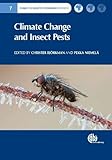Climate change and insect pests [electronic resource] Edited by C. Björkman, P. Niemelä.
Contributor(s): Björkman, C [edt] | Niemelä, P [edt].
Material type: BookSeries: CABI Climate Change Series: Publisher: Wallingford UK CABI 2015Edition: 1.Description: 279pp.Content type: text Media type: computer Carrier type: online resourceISBN: 9781780643793.Subject(s): invertebrates | pests | insects | climatic factors | population dynamics | eukaryotes | animals | pest insects | climatic change | forest pests | climate change | adaptation | Hexapoda | pest arthropods | insect pests | arthropods | arthropod pests | plant pestsAdditional physical formats: Printed edition:: No titleOnline resources: Click here to access online Summary: Insects, being poikilothermic, are among the organisms that are most likely to respond to changes in climate, particularly increased temperatures. Range expansions into new areas, further north and to higher elevations, are already well documented, as are physiological and phenological responses. It is anticipated that the damage to crops and forests by insects will increase as a consequence of climate change, i.e. increasing temperatures primarily. However, the evidence in support of this common belief"" is sparse. Climate Change and Insect Pests sums up present knowledge regarding both agricultural and forest insect pests and climate change in order to identify future research directions.
BookSeries: CABI Climate Change Series: Publisher: Wallingford UK CABI 2015Edition: 1.Description: 279pp.Content type: text Media type: computer Carrier type: online resourceISBN: 9781780643793.Subject(s): invertebrates | pests | insects | climatic factors | population dynamics | eukaryotes | animals | pest insects | climatic change | forest pests | climate change | adaptation | Hexapoda | pest arthropods | insect pests | arthropods | arthropod pests | plant pestsAdditional physical formats: Printed edition:: No titleOnline resources: Click here to access online Summary: Insects, being poikilothermic, are among the organisms that are most likely to respond to changes in climate, particularly increased temperatures. Range expansions into new areas, further north and to higher elevations, are already well documented, as are physiological and phenological responses. It is anticipated that the damage to crops and forests by insects will increase as a consequence of climate change, i.e. increasing temperatures primarily. However, the evidence in support of this common belief"" is sparse. Climate Change and Insect Pests sums up present knowledge regarding both agricultural and forest insect pests and climate change in order to identify future research directions.
| Item type | Current location | Call number | Status | Date due | Barcode |
|---|---|---|---|---|---|
 e-Books
e-Books
|
KAU Central Library, Thrissur e-Book | Available | EB756 |
Insects, being poikilothermic, are among the organisms that are most likely to respond to changes in climate, particularly increased temperatures. Range expansions into new areas, further north and to higher elevations, are already well documented, as are physiological and phenological responses. It is anticipated that the damage to crops and forests by insects will increase as a consequence of climate change, i.e. increasing temperatures primarily. However, the evidence in support of this common belief"" is sparse. Climate Change and Insect Pests sums up present knowledge regarding both agricultural and forest insect pests and climate change in order to identify future research directions.


There are no comments for this item.